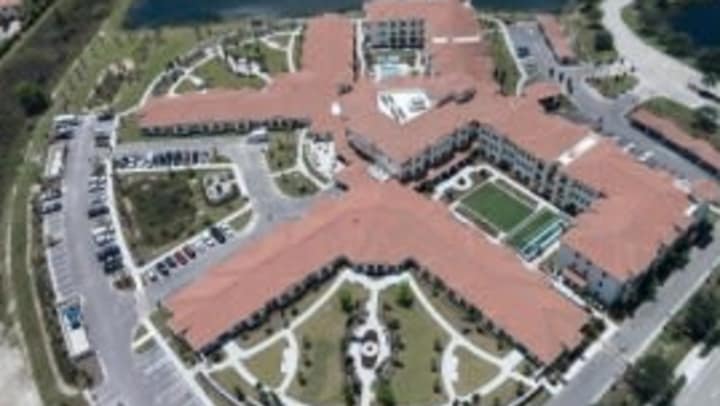Power has started to come back on at seniors housing communities throughout Florida following Hurricane Irma raking the west coast of the state, as operators are reporting mostly minor damage as a result.
Although national news has focused on the few failings during hurricanes Harvey and Irma — most notably with the viral picture of nursing home residents sitting calmly in waist-deep water near Houston and the death of two nursing home residents in Miami — on-the-ground reports have largely been positive.
“We’ve done a tremendous job as a state,” says Gail Matillo, president and CEO of Florida Argentum, the state’s branch of an industry association representing seniors housing operators. “Thousands of volunteers are helping to restore power where it’s still out, and many are helping deliver fuel to keep generators running.”
Brookdale, the industry’s largest owner and operator, has 137 communities in Florida and had to evacuate 16 of them, according to Matillo. Of those, half have already re-opened.
American House, an owner-operator based in Michigan, had to evacuate three of its six communities in Florida. Nine charter buses transported 250 residents and staff to another American House community outside the direct path of Irma. In addition, three rental trucks were used to transport medical and emergency supplies, including a two-week supply of food and 30-day supply of medications.
As of Tuesday, Sept. 12, the three properties were still without permanent power, but generators were allowing residents to return to their communities.
“The state was prepared. We got the word out early,” says Matillo. “Everyone prepared and evacuated when they needed to.”
Richard Hutchinson, CEO of Discovery Senior Living, reported his company needed to evacuate two communities, one near Tampa and another in Fort Myers. There were no reported injuries to the 3,000 Discovery residents in the affected area.
“The buildings did their job; they held up great,” says Hutchinson. “We have a lot of remediation to do for water intrusion, but no major damage. Once we get power fully restored, Irma should be mostly behind us.”
Discovery communities all feature backup generators with emergency plans in place in case power outages outlast fuel supplies. Additionally, the company worked closely with the governor’s office and the American Health Care Association to alert them to emergency situations when needed.
“Operating after the storm is more challenging than getting though the storm. We had plenty of supplies and food,” says Hutchinson. As examples of post-storm challenges, he cited the difficulty of finding diesel fuel for generators and workers unable to navigate impassable roads to reach the communities.
Many seniors housing workers were able to come down from neighboring states thanks to Florida’s willingness to make licensing exceptions that allowed the help.
“Our state officials were able to work with Medicaid and FEMA to get waivers on a lot of items to make sure that services were able to be brought to those affected in Florida,” says Susan Anderson, Florida Argentum’s vice president of public policy.
Recovery is moving along quickly now, according to Hutchinson. Food and fuel deliveries are back on track as power is being restored throughout the state.
Both Hutchinson and Argentum noted that despite the positive overall experience, there are still many lessons to take away. For example, Hutchinson noted that plans called for having plenty of availability on credit cards for emergency supplies. However, during power outages, stores can’t run credit cards anyway. For future emergencies, Discovery plans to have ample petty cash funds available as well.
“Like everybody else, we’re going to do an after-action review. We need to learn our lessons, update and prepare for the next one,” says Hutchinson. “Hopefully we can do as well then as we did for Irma.”
“Our industry demonstrated why we’re a great option for seniors,” adds Hutchinson. “We talk a lot about lifestyle. But it’s also about safety and security, the ability to have professionals there to handle needs during crises. As a whole, the seniors housing industry stepped up and answered the bell.”
— Jeff Shaw, Seniors Housing Business

